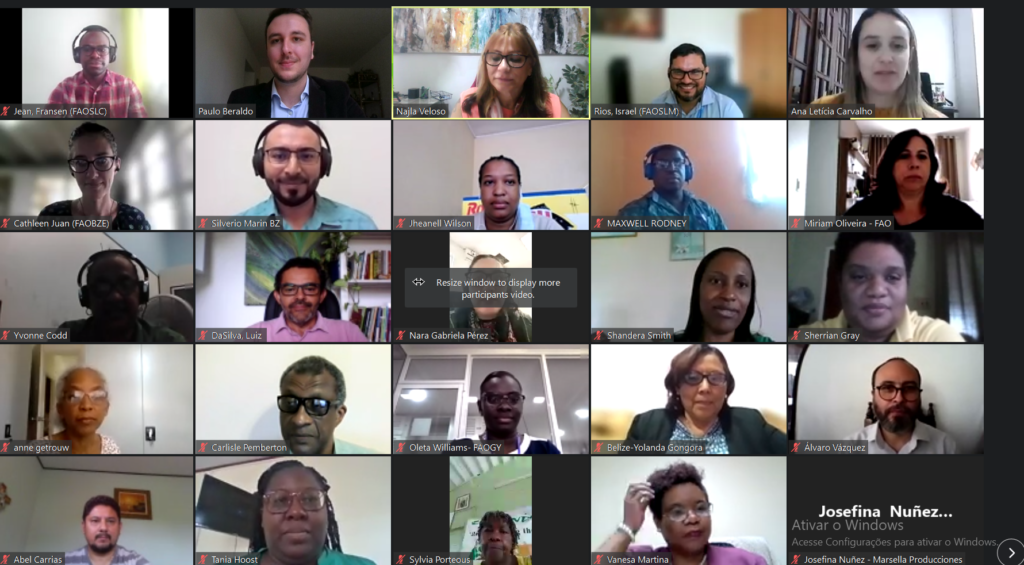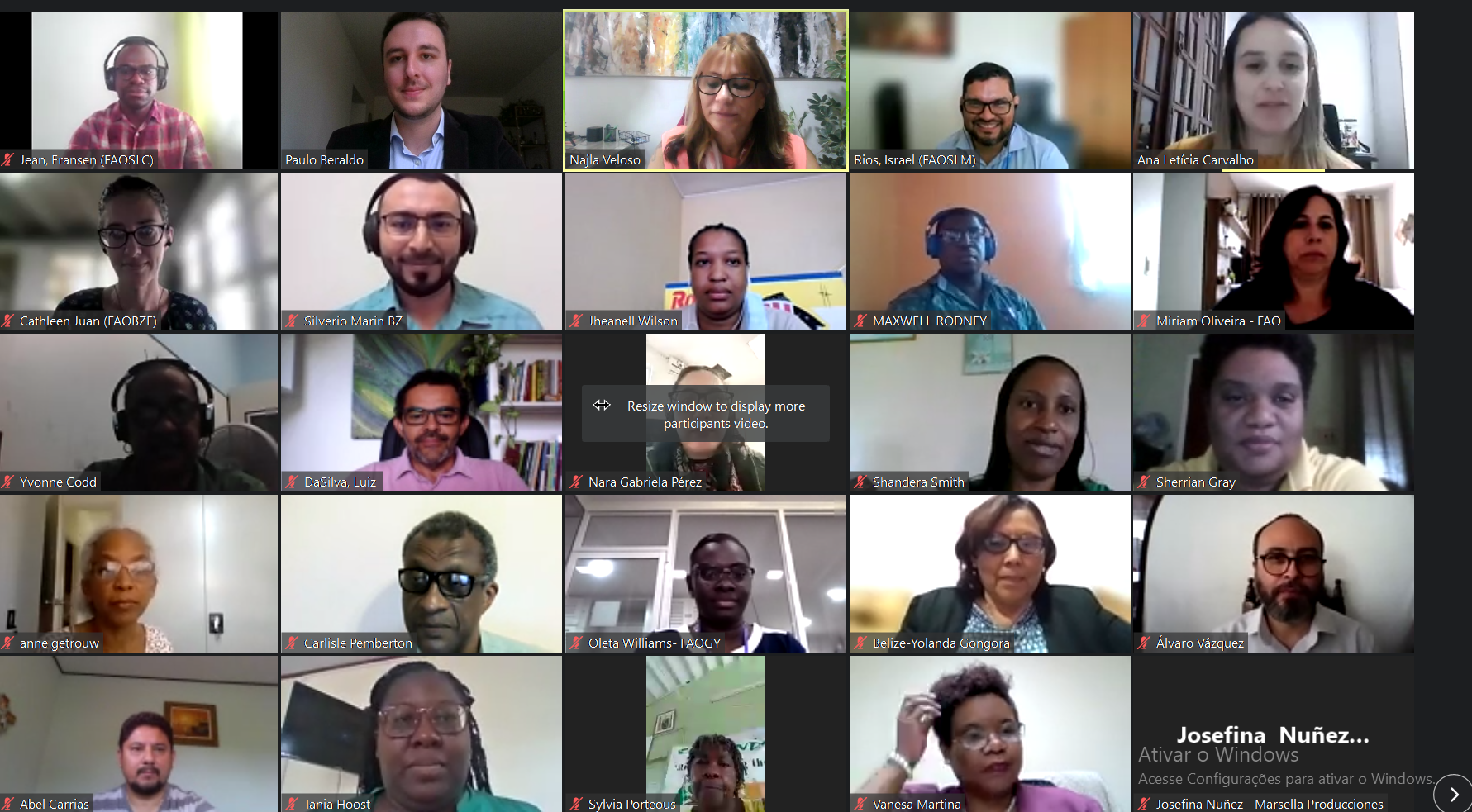For three weeks, the course strengthened the capacities of professionals from eight Caribbean countries
Brasília, December 7, 2021 – Around 100 professionals from eight Caribbean countries participated in the three sessions of the ‘Caribbean Capacity Training – Tools and good practices for a successful implementation’, developed by the project Consolidation of School Feeding Programs in LAC, carried out by the Brazilian Cooperation Agency (ABC/MRE), the National Fund for Educational Development (FNDE/MEC) and the Food and Agriculture Organization (FAO).
The training aimed to present practical tools and experiences that already work in different countries of the region to exchange knowledge with Caribbean managers. Professionals from the Bahamas, Belize, Guyana, Jamaica, Saint Lucia, Saint Vincent and the Grenadines, Suriname, and Trinidad and Tobago participated.
The course had panelists and experts on different topics such as Sustainable Schools, public procurements from family farming and legal frameworks for school feeding, as well as guests who act in practice in countries such as Brazil, Guatemala, El Salvador, Chile, Mexico, Trinidad and Tobago and others. The activity was supported by the Caribbean Community (Caricom) and the Mexican Agency for International Development Cooperation (Amexcid).

Sustainable Schools and the sustainability of SFPs
Begun on December 16, the virtual training focused on its first meeting in Sustainable Schools, a methodology developed by the Brazil-FAO Cooperation and which is currently being implemented in many Latin American and Caribbean countries. The session presented the six components of Sustainable Schools as a roadmap, addressing their importance in the context of the pandemic.
Inter-institutional articulation, school gardens and the link between school feeding and family farmers were considered necessary topics by the different panelists of the course. The sustainability of school feeding programs was also discussed to guarantee their continuity and universality, based on the approach of the human right to adequate food for students.
Public procurement from family farming
In the second session, public procurements from family farming for school feeding programs were the central axis of the discussions, especially in the pandemic. The difficulty for some farmers to access credit and to be part of the public procurement system was highlighted, for which the reduction of bureaucracies in these two processes was defended as a solution. The sum of efforts between family agriculture and school feeding was mentioned as a need to strengthen the local economy, and it was said that it can be achieved with social participation, institutional articulation, definition of public budgets and with long-term commitment by politicians.
As a challenge, the sales of cheap and junk food near schools and the difficulty of meeting the demands of schools by some small farmers was mentioned. The participants also commented on the possibility of school gardens being enhanced to offer a diversified complement in the supply of healthy food for students.
Legal framework for school feeding
In the third and last virtual meeting of the course, the panelists from the different countries elaborated a step by step on the construction of a legal framework for school feeding, from the awareness of the political class to its implementation. It was noted, for example, that the process demands the support of civil society, inter-institutional articulation, the definition of budgets, the involvement of family farmers, adequate menus and implementation of food and nutrition education actions.
The experience of more than 65 years of the Brazilian school feeding program, a public policy that is a reference for the Brazil-FAO International Cooperation, was also a topic in the discussion. Professor Carslile Pemberton, president of the Caribbean Agroeconomic Society, presented a systematization of the course, highlighting the importance of the different components of the school feeding programs addressed during the training, from a practical point of view, bringing people who are on the ground, in order to strengthen the capacities of managers.
The voice of the institutions
Representing Caricom, Shaun Baugh affirmed that this type of activity will continue to have the support of the institution and that the exchange of experiences and knowledge was incredible. Gloria Sandoval, director of the Mexican Agency for International Development Cooperation (Amexcid), thanked the course and the Brazilian experiences, highlighting the need for public policies with a comprehensive approach that affect health, development and education. “School feeding gains even more importance for our countries at this time. It is a privilege to have worked together.”
Bruno Silva, advisor to the National School Feeding Program (PNAE) of Brazil, carried out by the National Fund for Educational Development (FNDE), said that the Caribbean has a fundamental space in the work of the Cooperation. “It was a pleasure to participate and listen to you. The walk towards the sustainability of school feeding also involves identifying the right people in each institution. This is what happened in Brazil and it is what continues to happen today in this Cooperation”.
Also on behalf of the Brazilian government, Paola Barbieri, ABC/MRE project analyst, pointed out that the three sessions had very specific practices that will help professionals deepen their capacities, highlighting the support of partner institutions and the interest of the Agency to continue contributing to these activities, within the framework of the project and the RAES.
As part of the closing of the course, Najla Veloso, regional coordinator of the project Consolidation of School Feeding Programs in LAC, described the training activity as one of the best possibilities for dialogue on these issues. “We met with people who have a lot of experience, brought concepts and practices, concrete results and reflections”, evaluated.
Najla also pointed out that the Sustainable School Feeding Network (RAES) will have a platform in three languages to continue promoting dialogues, thematic debates, sharing experiences, news, workshops and courses for the entire region. RAES is an international cooperation tool created by the Government of Brazil in 2018, with the support of FAO, to build capacities, exchange experiences, disseminate knowledge and strengthen school feeding programs in the region. At the end, the coordinator added: “We believe in the development of people so that they feel capable. The empowered people are those who drive changes in social policies and in the quality of life of populations.”
This content was produced by the project Consolidation of School Feeding Programs in Latin America and the Caribbean







